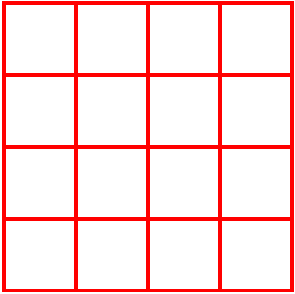This section requires Javascript.
You are seeing this because something didn't load right. We suggest you, (a) try
refreshing the page, (b) enabling javascript if it is disabled on your browser and,
finally, (c)
loading the
non-javascript version of this page
. We're sorry about the hassle.
4 solutions
Formula is 1+4+9+16+..n^2 where n is side length of square(4 in this case)
Counting squares for n = 1 , 2 , 3 we find a pattern for the general case:
n 1 2 3 . . . n C o u n t 1 1 + 2 . 2 1 + 2 . 2 + 3 . 3 . . . 1 2 + 2 2 + 3 2 + . . . + n 2 T o t a l 1 5 1 4 . . . ∑ k = 1 n k 2
We have a well known summation (the closed form could be derived by finite calculus): ∑ k = 1 n k 2 = 6 n ( n + 1 ) ( 2 n + 1 )
Then for n = 4 :
6 4 ( 4 + 1 ) ( 2 . 4 + 1 ) = 3 0
In a standard n*n grid, number of squares is given by Σ n 2 = 6 n ( n + 1 ) ( 2 n + 1 )
Note here n = 4.

16 1by1 +9 2by2+4 3by3 +1 4by4